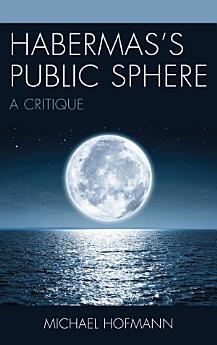Habermas’s Public Sphere: A Critique
Michael Hofmann
Mei 2017 · Rowman & Littlefield
E-boek
286
Bladsye
family_home
Geskik
info
reportGraderings en resensies word nie geverifieer nie. Kom meer te wete
Meer oor hierdie e-boek
Habermas’s Public Sphere: A Critique analyzes the evolution of Juergen Habermas’s social and political theory from the 1950s to the present by focusing on the explicit and on the tacit changes in his thinking about The Structural Transformation of the Public Sphere, his global academic bestseller, which has been translated into 30 languages. Integrating “public sphere,” “discourse,” and “reason,” the three categories at the center of his lifelong work as a scholar and as a public intellectual, Habermas’s classic public sphere concept has deeply influenced an unusually high number of disciplines in the social sciences and in the humanities. In the process, its complex methodology, whose sources are not always identified, can be perplexing and therefore lead to misunderstandings.
While Habermas’s “Further Reflections on the Public Sphere” (1992) contain several far-reaching clarifications, they still do not identify a number of the most important sources for his methodology, above all Herbert Marcuse and Ernst Bloch. Hence, a key purpose of this study is to thoroughly analyze the Marxist critique of ideology that Habermas uses in dialectical fashion for his theory reconstruction of Immanuel Kant’s liberal ideal of a rational-critical public as the organizational principle of the constitutional state and as the method of Enlightenment. Such dialectical thinking allows him to appropriate the structure of Reinhart Koselleck’s Critique and Crisis and of Carl Schmitt’s writings on the modern state while simultaneously upending their conservative critique of Liberalism and of the Enlightenment. However, this strategy restricts the application of his concept to his stylizations of the French Revolution and of his British “model case.”
This critique reinvigorates Habermas’s seminal distinction between the purely political polis of antiquity, which excludes the private economy from the res publica, and the modern public sphere with its rational-critical discourse about commodity exchange and social labor in the political economy. At the same time, it identifies the crises of seventeenth-century England and the Dutch Republic as the origins of the new channels of public communication used to constantly evaluate the role of state power as political facilitator and regulator of an increasingly complex, dynamic, and crisis-prone market economy.
While Habermas’s “Further Reflections on the Public Sphere” (1992) contain several far-reaching clarifications, they still do not identify a number of the most important sources for his methodology, above all Herbert Marcuse and Ernst Bloch. Hence, a key purpose of this study is to thoroughly analyze the Marxist critique of ideology that Habermas uses in dialectical fashion for his theory reconstruction of Immanuel Kant’s liberal ideal of a rational-critical public as the organizational principle of the constitutional state and as the method of Enlightenment. Such dialectical thinking allows him to appropriate the structure of Reinhart Koselleck’s Critique and Crisis and of Carl Schmitt’s writings on the modern state while simultaneously upending their conservative critique of Liberalism and of the Enlightenment. However, this strategy restricts the application of his concept to his stylizations of the French Revolution and of his British “model case.”
This critique reinvigorates Habermas’s seminal distinction between the purely political polis of antiquity, which excludes the private economy from the res publica, and the modern public sphere with its rational-critical discourse about commodity exchange and social labor in the political economy. At the same time, it identifies the crises of seventeenth-century England and the Dutch Republic as the origins of the new channels of public communication used to constantly evaluate the role of state power as political facilitator and regulator of an increasingly complex, dynamic, and crisis-prone market economy.
Meer oor die skrywer
Michael Hofmann teaches multimedia studies at Florida Atlantic University.
Gradeer hierdie e-boek
Sê vir ons wat jy dink.
Lees inligting
Slimfone en tablette
Installeer die Google Play Boeke-app vir Android en iPad/iPhone. Dit sinkroniseer outomaties met jou rekening en maak dit vir jou moontlik om aanlyn of vanlyn te lees waar jy ook al is.
Skootrekenaars en rekenaars
Jy kan jou rekenaar se webblaaier gebruik om na oudioboeke wat jy op Google Play gekoop het, te luister.
E-lesers en ander toestelle
Om op e-inktoestelle soos Kobo-e-lesers te lees, moet jy ’n lêer aflaai en dit na jou toestel toe oordra. Volg die gedetailleerde hulpsentrumaanwysings om die lêers na ondersteunde e-lesers toe oor te dra.






